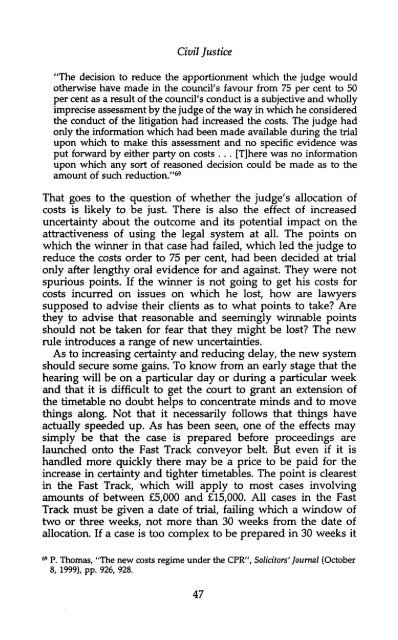HAMLYN - College of Social Sciences and International Studies ...
HAMLYN - College of Social Sciences and International Studies ...
HAMLYN - College of Social Sciences and International Studies ...
You also want an ePaper? Increase the reach of your titles
YUMPU automatically turns print PDFs into web optimized ePapers that Google loves.
Civil Justice<br />
"The decision to reduce the apportionment which the judge would<br />
otherwise have made in the council's favour from 75 per cent to 50<br />
per cent as a result <strong>of</strong> the council's conduct is a subjective <strong>and</strong> wholly<br />
imprecise assessment by the judge <strong>of</strong> the way in which he considered<br />
the conduct <strong>of</strong> the litigation had increased the costs. The judge had<br />
only the information which had been made available during the trial<br />
upon which to make this assessment <strong>and</strong> no specific evidence was<br />
put forward by either party on costs . . . [T]here was no information<br />
upon which any sort <strong>of</strong> reasoned decision could be made as to the<br />
amount <strong>of</strong> such reduction." 69<br />
That goes to the question <strong>of</strong> whether the judge's allocation <strong>of</strong><br />
costs is likely to be just. There is also the effect <strong>of</strong> increased<br />
uncertainty about the outcome <strong>and</strong> its potential impact on the<br />
attractiveness <strong>of</strong> using the legal system at all. The points on<br />
which the winner in that case had failed, which led the judge to<br />
reduce the costs order to 75 per cent, had been decided at trial<br />
only after lengthy oral evidence for <strong>and</strong> against. They were not<br />
spurious points. If the winner is not going to get his costs for<br />
costs incurred on issues on which he lost, how are lawyers<br />
supposed to advise their clients as to what points to take? Are<br />
they to advise that reasonable <strong>and</strong> seemingly winnable points<br />
should not be taken for fear that they might be lost? The new<br />
rule introduces a range <strong>of</strong> new uncertainties.<br />
As to increasing certainty <strong>and</strong> reducing delay, the new system<br />
should secure some gains. To know from an early stage that the<br />
hearing will be on a particular day or during a particular week<br />
<strong>and</strong> that it is difficult to get the court to grant an extension <strong>of</strong><br />
the timetable no doubt helps to concentrate minds <strong>and</strong> to move<br />
things along. Not that it necessarily follows that things have<br />
actually speeded up. As has been seen, one <strong>of</strong> the effects may<br />
simply be that the case is prepared before proceedings are<br />
launched onto the Fast Track conveyor belt. But even if it is<br />
h<strong>and</strong>led more quickly there may be a price to be paid for the<br />
increase in certainty <strong>and</strong> tighter timetables. The point is clearest<br />
in the Fast Track, which will apply to most cases involving<br />
amounts <strong>of</strong> between £5,000 <strong>and</strong> £15,000. All cases in the Fast<br />
Track must be given a date <strong>of</strong> trial, failing which a window <strong>of</strong><br />
two or three weeks, not more than 30 weeks from the date <strong>of</strong><br />
allocation. If a case is too complex to be prepared in 30 weeks it<br />
69 P. Thomas, "The new costs regime under the CPR", Solicitors' Journal (October<br />
8, 1999), pp. 926, 928.<br />
47

















